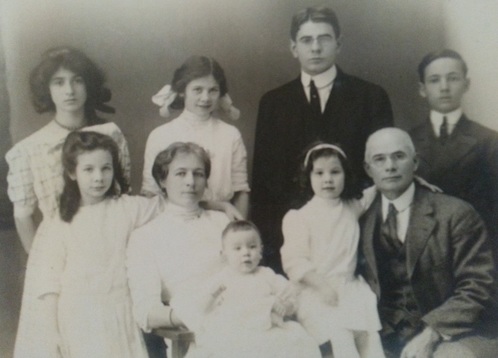 My maternal great-grandparents
My maternal great-grandparents Most children are repelled by the thought of touching another person—girls have “coudies,” we say, and certainly no girl would touch her lips to a cup used by a boy, for boys have nasty, smelly, dirty “coudies” even worse than girls. As we grow older, however, we overcome our fear of other people and realize our need for physical intimacy. When Jesus says we must “feed” on Him we understand this demand of love.
“Feeding” on the beloved must be exclusive. “I can only love one person at a time,” as Mother Teresa said. Marriage, in its fullest expression, is monogamous and lifelong. How consoling it is to a child to know that his parents are faithfully married. “With this ring I thee wed,” vows the man, “for richer and for poorer, in sickness and in health, until death do us part.” My parents have given me so much—they’ve fed and clothed me, given me a college education, they’ve given me a birthday card every year since 1967. But their greatest gift to me is their fidelity to each other. They have persevered in marriage, at times only able to hold on for our sake, for 63 years. Last month I heard Christoph Cardinal Schonborn describe the pain he has felt continuously since his ninth year, when his parents divorced. “Every day I hoped that my mother and my father would come back together. The pain of their separation has never left me.” Some say the Church should show mercy to adults who find it “impossible” to stay married. But what about mercy toward their children? As a rule the pain of divorce hurts children far more deeply than the pain of a difficult marriage hurts adults. Can we adults learn to love each other, or at least to suffer each other, for the sake of our children?
Every day I pray for my deceased grandparents, after a long list of friends and family who are still breathing. What joy it gives me to pray for them as couples, for all four of them died married to their first loves. I can’t say they were “in love” when they died—my paternal grandparents moved apart for the last 20 years of their marriage. But they did not divorce, and that fidelity has given their children, and their grandchildren, a wonderful sense of security. In putting up with each other’s frailties, they gave us good reason to believe that authentic love—willing the good of the other, rather than mere personal feelings—is possible. They have ennobled us by their faithfulness. Let us insist, as much as possible, on the irreplaceable good of lifelong monogamous marriage, for love of our children.
Here are some resources for your marriage you may find of benefit:
ForYourMarriage.org, an initiative of the United States Council of Bishops
Workshops
Books
- For Better Forever: A Catholic Guide to a Lifelong Marriage
- The Marriage You’ve Always Wanted – This is not a Catholic book, but it is a very good Christian self-help book


 RSS Feed
RSS Feed